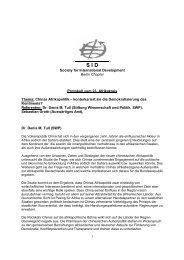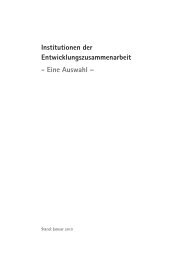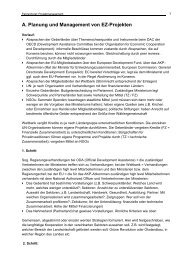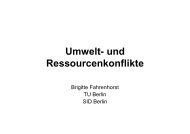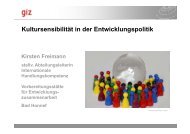Konferenzbericht (PDF-Dokument, 3 MB) - SID
Konferenzbericht (PDF-Dokument, 3 MB) - SID
Konferenzbericht (PDF-Dokument, 3 MB) - SID
Sie wollen auch ein ePaper? Erhöhen Sie die Reichweite Ihrer Titel.
YUMPU macht aus Druck-PDFs automatisch weboptimierte ePaper, die Google liebt.
Wissen wandert<br />
chen Gebiete zur Hilfe für die Bauern. Und ferner ändern<br />
sich die Beziehungen zum Herkunftsland, da – im Ge-<br />
gensatz zu früher – Distanzen immer leichter zu über-<br />
winden sind. Diese neuen Trends verlangen neue Kon-<br />
zepte: Ausbildung und Zugang zu Arbeit für beide Typen<br />
von MigrantInnen, Vermeidung des Rückfalls der zwei-<br />
ten und dritten Generation regulärer MigrantInnen in die<br />
irreguläre Migration, Unterstützung der Herkunftsländer,<br />
wozu der Autor verschiedene Ansätze vorschlägt. Es<br />
sind die Städte, und nicht nur die Landesregierungen<br />
gefragt, neue Wege zu gehen, um die Voraussetzungen<br />
für eine triple win Situation zu schaffen und zu verhin-<br />
dern, dass eine neue Unterklasse entsteht. Der Autor<br />
fordert, dass dazu die bisherige ad hoc Politik der kurz-<br />
fristigen mitunter undurchdachten Reaktionen durch<br />
einen systemischen Ansatz ersetzt werden muss. Dazu<br />
schlägt er der Politik vor, mit den MigrantInnen und der<br />
Gesamtbevölkerung in einen regelmäßigen Dialog zu<br />
treten und eine koordinierende Agentur einzurichten, die<br />
sich sowohl mit den Potenzialen der MigrantInnen in der<br />
Aufnahmestadt als auch mit den Potenzialen zur Förde-<br />
rung der Entwicklung des Herkunftslandes befasst.<br />
The new realities of migration and the city<br />
- Migration is not longer marginal and not passing by;<br />
92<br />
it will be a dominant characteristic of urban life in<br />
generations to come, for the economy; the culture;<br />
the quality and the coherence of the society. The<br />
tendency the consider migration as marginal, ab-<br />
normal and exceptional is a fatal mistake for a<br />
maximum utilisation and regulation of this global<br />
phenomenon.<br />
- Migration is not just brain drain and a loss for the<br />
sending country as it was perceived until recently. If<br />
well treated migration could have a triple win out-<br />
come: for the migrant, for the receiving society -read<br />
city - and for the sending country.<br />
- This triple win situation is first and foremost applica-<br />
ble to the so called wanted and regulated migration<br />
knowledge migrates<br />
flows, in which there is a balance between demand<br />
and supply – to speak in market terms -, but even<br />
then this is not a process which doesn‟t demand a<br />
strong and coherent set of policies, in the area of<br />
schooling and education, housing, integration, pro-<br />
tection. Recent international reports underscore the<br />
potential and the need for regulation of this flow, for<br />
tailor made policies sometimes (nationalities, ethnici-<br />
ties), but also of the indispensability and the added<br />
value of the presence of migrants for the receiving<br />
societies.<br />
- But there is also another reality: the growing divide<br />
between wanted, regulated migration flows, and the<br />
flows which are not asked for and which are - again<br />
in unworthy market terms - supply driven. But it is an<br />
illusion to think that the second category is temporar-<br />
ily or can be contained. In a globalising world which<br />
is open for the transfer of goods, finances, services<br />
and above all information there are no longer<br />
boundaries which can‟t be penetrated by human be-<br />
ings. Human beings are naturally triggered by their<br />
ambition to escape poverty and to foster self devel-<br />
opment, but also and increasingly by pressures from<br />
outside: environmental degradation; civil war and un-<br />
rest, suppression, failing states, discrimination. And<br />
a rather new but lasting and a growing phenomenon:<br />
one or more members of an extended family are sent<br />
abroad as an instrument for social insurance and se-<br />
curity, to take care of additional foreign currency and<br />
goods.<br />
- Not only the origin and motives of migration are<br />
changing as is its permanency, but also the relation-<br />
ship between roots and future of the migrants. Mi-<br />
grants three generations ago virtually cut off all their<br />
linkages with the sending country as was the case<br />
with many immigrants from Europe to North America.<br />
One or two generations ago there remained some<br />
family and societal contacts, but the main orientation<br />
was on the receiving country, but nowadays the



